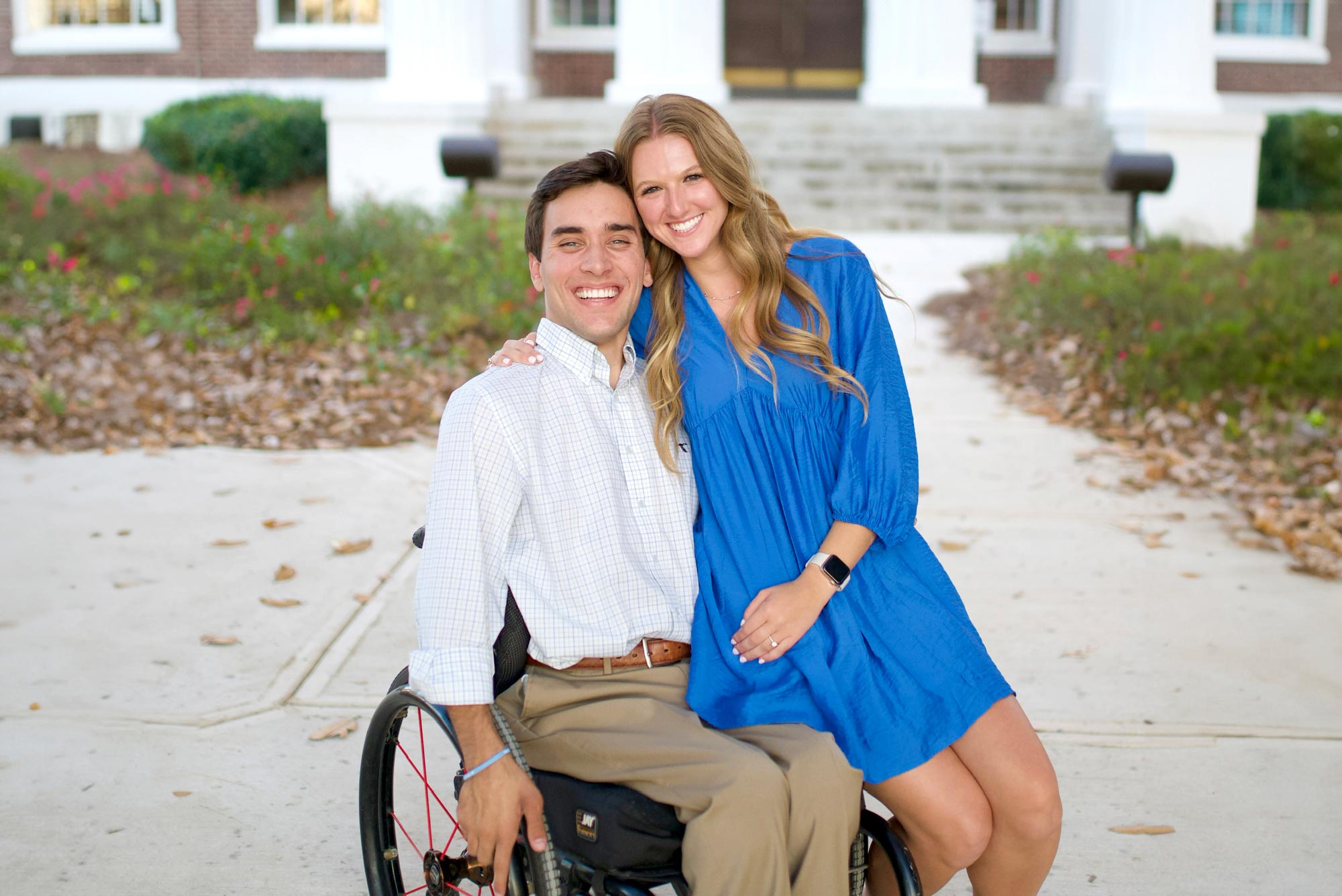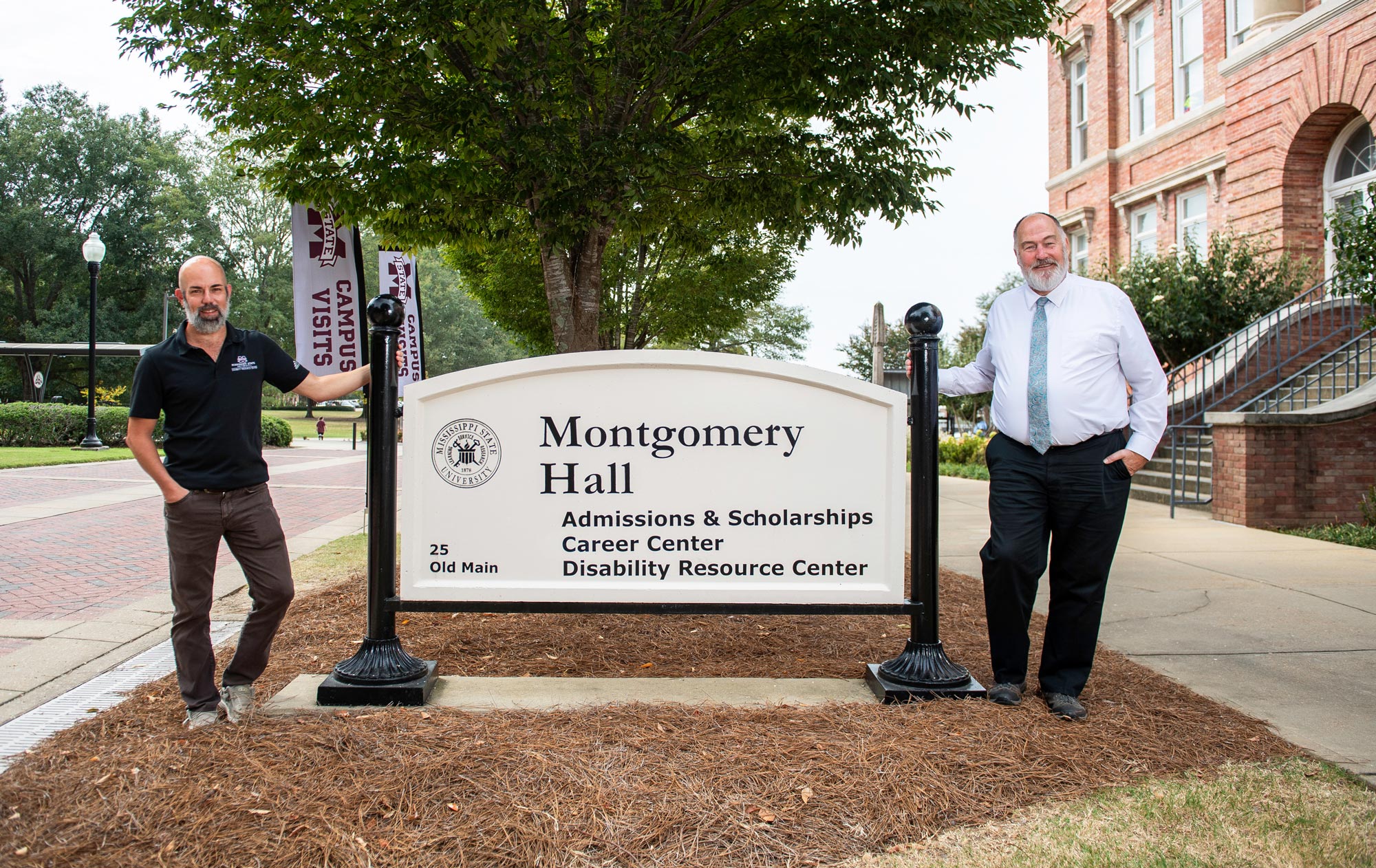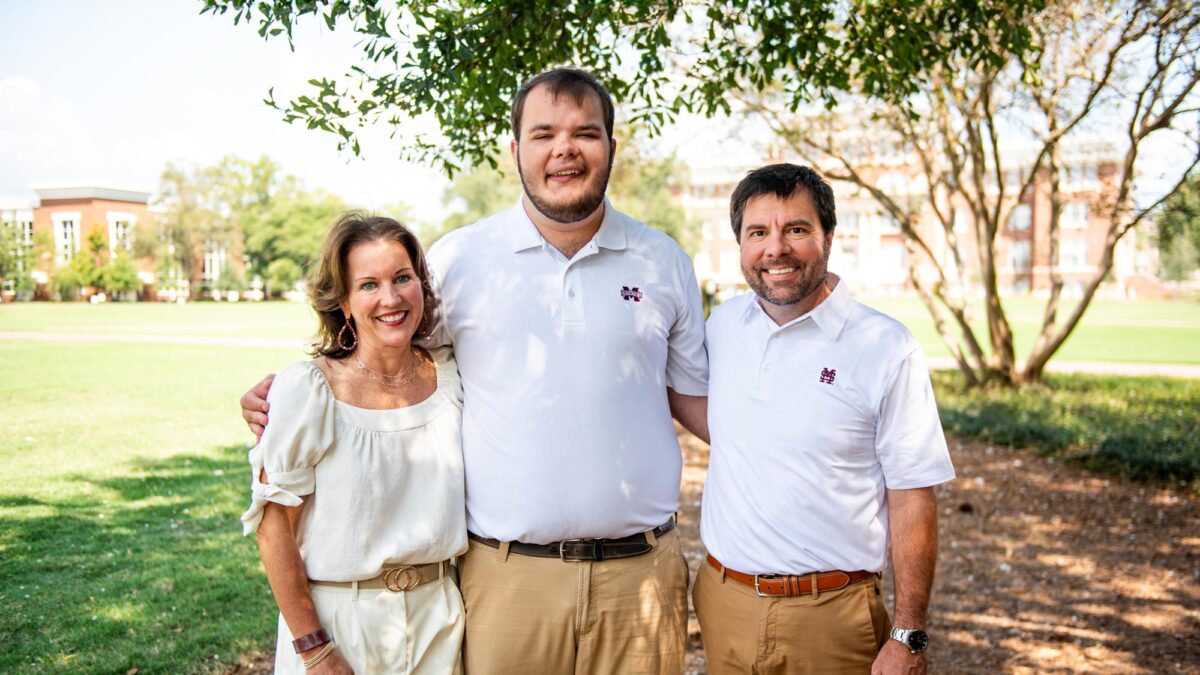MSU Disability Resource Center provides extra help to Bulldogs along their academic path
Will is following the path of his brother, Thomas, whose experiences at Mississippi State sold Scott and Marti on encouraging Will to enroll.
“We were ready to push him out of the car door,” Marti joked.
Will, who has the chromosomal disorder DiGeorge syndrome, receives academic and overall support through the MSU Disability Resource Center. The Guests knew of this center and its various services through firsthand experience that began in 2018 when Thomas was paralyzed in an all-terrain vehicle accident during his first semester at State.
While Thomas’ friends and family rallied around him as he recovered, MSU faculty and staff, led by the DRC, went to work planning the accommodations that would ensure he experienced as smooth of a transition as possible upon returning to campus.
“When Thomas said MSU had gone the extra mile—that they made sure he could get in the doors, get to class and had help taking tests—when he first came back, that meant the world to me. That’s what built our family’s trust in MSU,” Marti said. “When Will was accepted, it was such a blessing to find that next puzzle piece in his life.
“We thought if he could get a four-year experience being a normal college kid just like his brother did, that’s going to be the launch pad to open up his future like nothing else,” she added.
Will is part of the ACCESS program, which is housed in the DRC. One of only a handful of its kind in the country, ACCESS is a four-year, residential program that ensures students with intellectual or developmental disabilities receive inclusive academic, social, career development and independent living experiences. The goal is to allow these students to become gainfully employed and live as independently as possible upon completing the program.
“The staff and administration of the Disability Resource Center and ACCESS program are so phenomenal, and their goal is our goal—taking care of our child,” Marti said. “He’s my kid, not theirs—and they’re going to love him just as much as I do? To have that feeling as a parent, I was like, ‘Go get it, Will.’ I feel so safe with him there.”

A path to success
Every day, MSU faculty and staff demonstrate their commitment to creating pathways to success for their students.
For Thomas, that commitment yielded a literal path from his fraternity house to the nearby sidewalk and across the street, ensuring he could get to class. It also meant trips across campus, from building to building, with DRC staff to plot a course according to his class schedule, as well as other one-on-one activities and exercises preparing him for his return to MSU.
“Mississippi State welcomed me back with open arms and with a plethora of resources to help me start again. It was even down to, ‘You’re going to come up this ramp to this automatic door and hit this button to get in. You’ll go down this hallway to the classroom, and there will be a space for you here,’” Thomas recalled. “I probably called [DRC associate director] Micah White three or four times before the first day back, just nervous with questions, and he was like, ‘We got you.’
“As that first day went along, I remember thinking, ‘This is going to work. I can do it; it’s not impossible,’” he added. “It was so empowering that I felt like I could do anything.”
One successful day turned into a successful week, and that momentum continued through 2021 when Thomas graduated with a bachelor’s degree in business administration. A year later, he graduated from the South Carolina-based Arrhythmia Technologies Institute, where he studied cardiac rhythm management. He recently married fellow MSU graduate Emily Rhea and they live in Austin, Texas, where he works in Abbot Laboratories’ cardiac electrophysiology division.
“Mississippi State is one of the most accommodating, caring and nurturing places that I’ve ever experienced,” Thomas said. “They did things to help me grow and pushed me to do things I truly didn’t think I was going to be able to do. Mississippi State has something to offer everyone. They’re going to work with you and figure out a plan.
“The people around you do matter, and I was blessed to have amazing people around me,” he continued. “The folks at the Disability Resource Center were striving to do better for me and everyone else they served. I can assure you, not only could I have not gotten that experience anywhere else, but I could not have gotten through college without what Mississippi State provided.”
A future filled with potential
Before joining the MSU ACCESS program, Will said he never saw a possible future in sports videography. Now, as a sophomore, he has experience working at WMSV, the MSU radio station where he recorded numerous sports-related reports, and will audit broadcast and multi-media journalism classes offered by the Department of Communication in the years to come.
Following completion of the program, Will said he hopes to turn his interest into a career.
“I had so much fun working at the radio station but working at football games and traveling with the team on away games—I would love to do that. That’s the job I really want to do,” he said. “I still remember when I moved here and that first time of being by myself at the dorm after everyone left. I felt like, ‘Wow, I’m at State. I’m in college.’ It just shocked me because I couldn’t believe I made it. My parents said God put Thomas on a pathway for himself but his accident put me on a pathway, too.”
During their time at State, ACCESS students take life skills and foundational classes with topics ranging from money management to basic writing. They also audit undergraduate courses of their choosing, which allows them to study their specific interests.
“You worry about what the ceiling is for your kids and is this or that the best they can do. Then you realize there’s another option with the ACCESS program,” Scott said. “To me, that was a big relief, just for Will to have opportunities in the future. You want your children to have as many pathways to choose from as possible and for them to be able to dictate what their potential can be.”
Thomas said encouraging his brother to enroll at MSU “was a no-brainer,” especially after his own experience.
“I had the confidence to tell my parents and my brother that MSU is exactly what he needed,” Thomas said. “What MSU did for me was incredibly humbling, and now I’m so proud of the university for what it is doing for my brother.”

‘Give it their all’
Located in Montgomery Hall, the DRC serves as the coordinating body for all disability-related services and accommodations approved for Mississippi State students. These assistances depend on the specific needs of the student and can range from extended test-taking times in distraction-reduced environments to housing accommodations and assistive technologies, including screen-reader software and Braille services.
Currently, the office supports almost 2,000 students, most of which have disabilities “that aren’t apparent to others,” said Chris Dallager, director of the Disability Resource Center. He said these range from chronic health conditions to cognitive issues.
“We sometimes think of people who have blindness or deafness, or people who use wheelchairs, but that’s only a small percentage of the total number of people that we work with,” he said. “Disability is maybe the most inclusive identity group there is, because everybody can be part of this group at some point in their lives. Some are born into it—a lifelong thing—and some are in and out of it. It’s quite varied and not limited to sex, race or gender.”
Because of the wide-ranging issues encountered by the DRC, staff members develop expertise in many different areas.
“Our staff take great pride in the work they do,” Dallager said. “They come in and give it their all every day. We have people developing programs specific to learning disabilities and specific mental health concerns across the spectrum of needs.
“I think what we’ll see in the coming years in terms of support will be really exciting,” he continued. “The range of support on campus beyond our own office is really helped by our allies within faculty and staff throughout campus. We have so many great allies here, and I’m really proud of them and our staff within the DRC.”
By Carl Smith, Photos by Grace Cockrell & Submitted

Of the almost 2,000 students served by the Mississippi State Disability Resource Center, many receive supports and accommodations related to non-physical issues—specifically, mental health needs, from anxiety and depression to learning disabilities.
“Since the early days of the pandemic, we’ve seen a sharp increase in students who, because of these mental health issues, have required more absences, assignment extensions and other accommodations to help them out,” said Micha White, DRC associate director. “We’re always an open door, and we’re willing to help anybody we can.”
Outside of DRC support, MSU has numerous mental health resources and care options students can access:
Student Counseling Services offers free, confidential services at its physical location in Hathorn Hall and via telehealth.
Office of Survivor Support provides comprehensive support and advocacy services to those who have experienced sexual harassment, assault and exploitation; stalking; dating and domestic violence; and other crimes.
MSU Psychology Clinic offers a range of services—from individual and group therapies to comprehensive assessments and parent training and education—through the Department of Psychology housed in Magruder Hall.
Telus Health Student is an app that provides free, confidential support to students through text and chat with a licensed mental health professional 24 hours a day, seven days a week. It also hosts videos and articles about well-being topics.
“Mental health concerns have been increasingly prevalent among college-aged students, and Mississippi State has not been immune to the increasing need to provide more mental health services,” said Vice President for Student Affairs Regina Hyatt, whose office is responsible for many of the university’s mental health-related services and organizations.
“Over the past couple of years we have added a full-time psychiatric nurse practitioner to the Longest Student Health Center’s staff and begun embedding mental health professionals within our academic colleges,” she continued. “Many of our efforts are aimed at de-stigmatizing help-seeking behaviors and encouraging students to invest in their well-being before a mental health crisis happens.”
Additional support can be found at counseling.msstate.edu/resources.
Mississippi State Libraries Technology and Innovation Director Thomas La Foe, left, assists Rebekah Carruth, a junior philosophy major from Starkville, with the operation of the Swell Form Graphics Machine. Housed in Mitchell Memorial Library’s MaxxSouth Digital Media Center, the new printer creates tactile images for low-vision learners.
Mitchell Memorial Library houses tactile printer for low-vision learners
A bit of bumpiness can lead to a smooth learning experience thanks to cutting-edge technology now available at Mississippi State University to aid low-vision learners.
Last year, Mitchell Memorial Library’s MaxxSouth Digital Media Center became home to a Swell Form Graphics Machine, through a $3,000 Ottilie Schillig Special Teaching Project grant and additional support from MSU Libraries and the Disability Resource Center.
The printer creates tactile images from diagrams, graphs or graphics input into the system. Users copy the image they want to create onto a special paper and then run the new copy through the machine. Heat interacts with the black ink and special paper causing the drawings to swell and rise off the paper, creating an image the user can feel and interpret with their hands.
“This technology can be transformative for students and help their instructors be able to adequately present pictures and graphs to students to help them understand course content,” said Kathleen Thomas, a professor and head of the MSU Department of Finance and Economics who spearheaded the grant application.
After realizing alternative text descriptions of graphs and other visual elements used in her class could be confusing to some, Thomas began researching options to help better present instructional material to students. A conversation with Michelle McDonnall, director of MSU’s National Research and Training Center on Blindness and Low Vision, led her to pursue the Swell Form Printer.
As fate would have it, Thomas met low-vision learner Tillman Newton, a senior secondary education major from Vancleave who enrolled in her microeconomics class, after the grant secured the assistive technology.
After experiencing the printer’s benefits, Newton said it “changed the way I’m looking at education and my own career.”
“I plan on using it now with my classes, and I also want to use it in my own future classroom to better my students’ experiences,” Newton said. “Having access to equal opportunities as other students and coworkers is a really great thing.”
The DRC currently assists approximately 40 low-vision learners, but the machine is available for all students and faculty to use.


